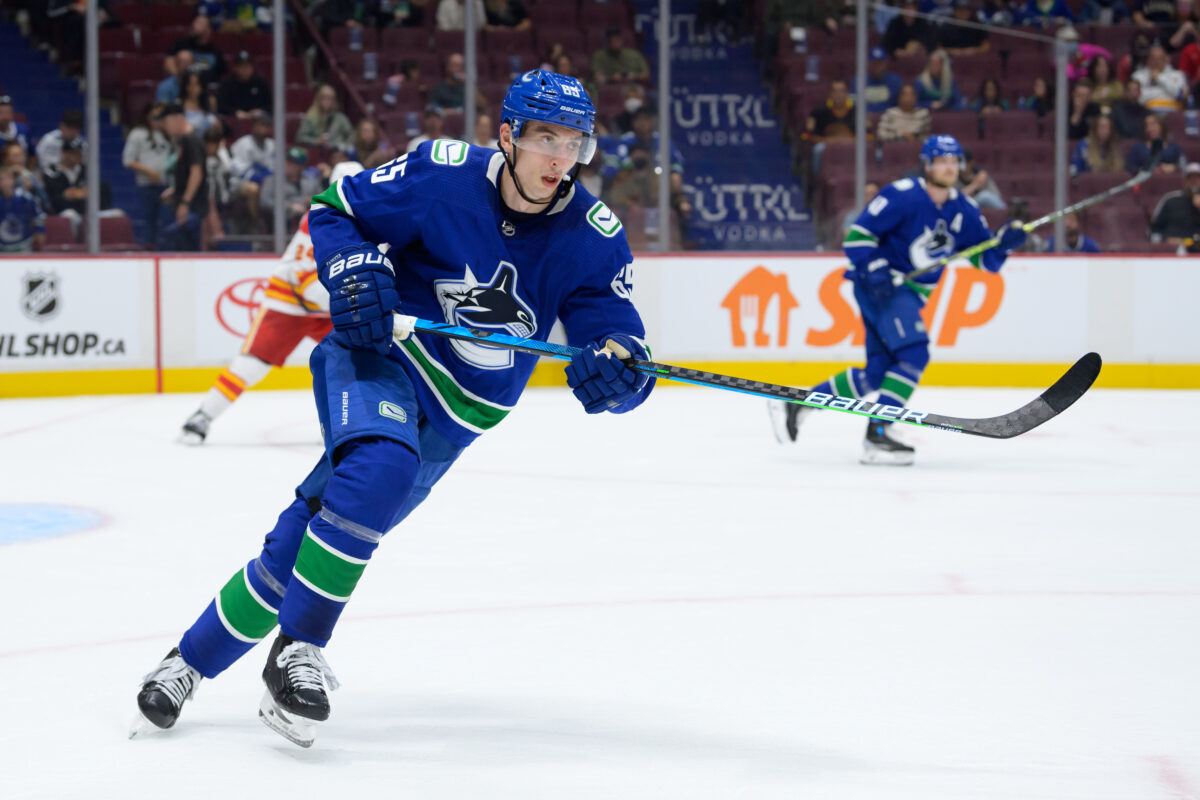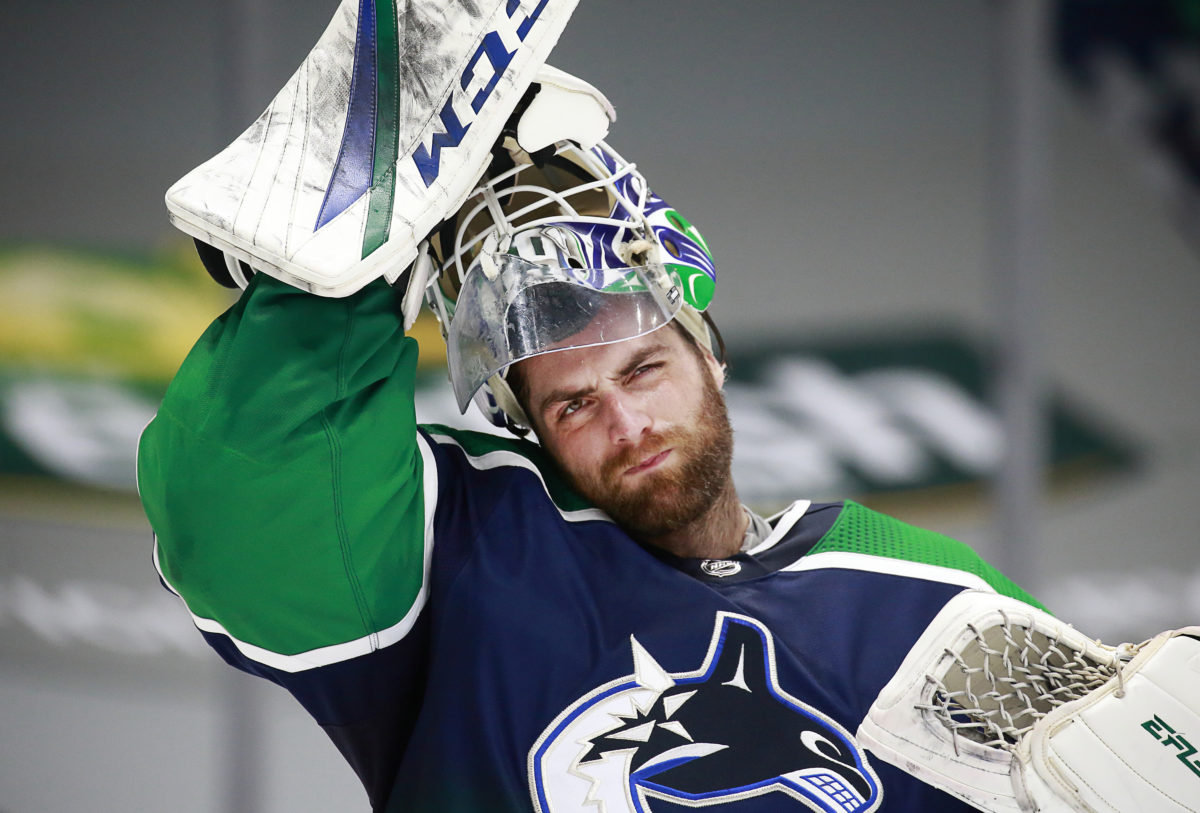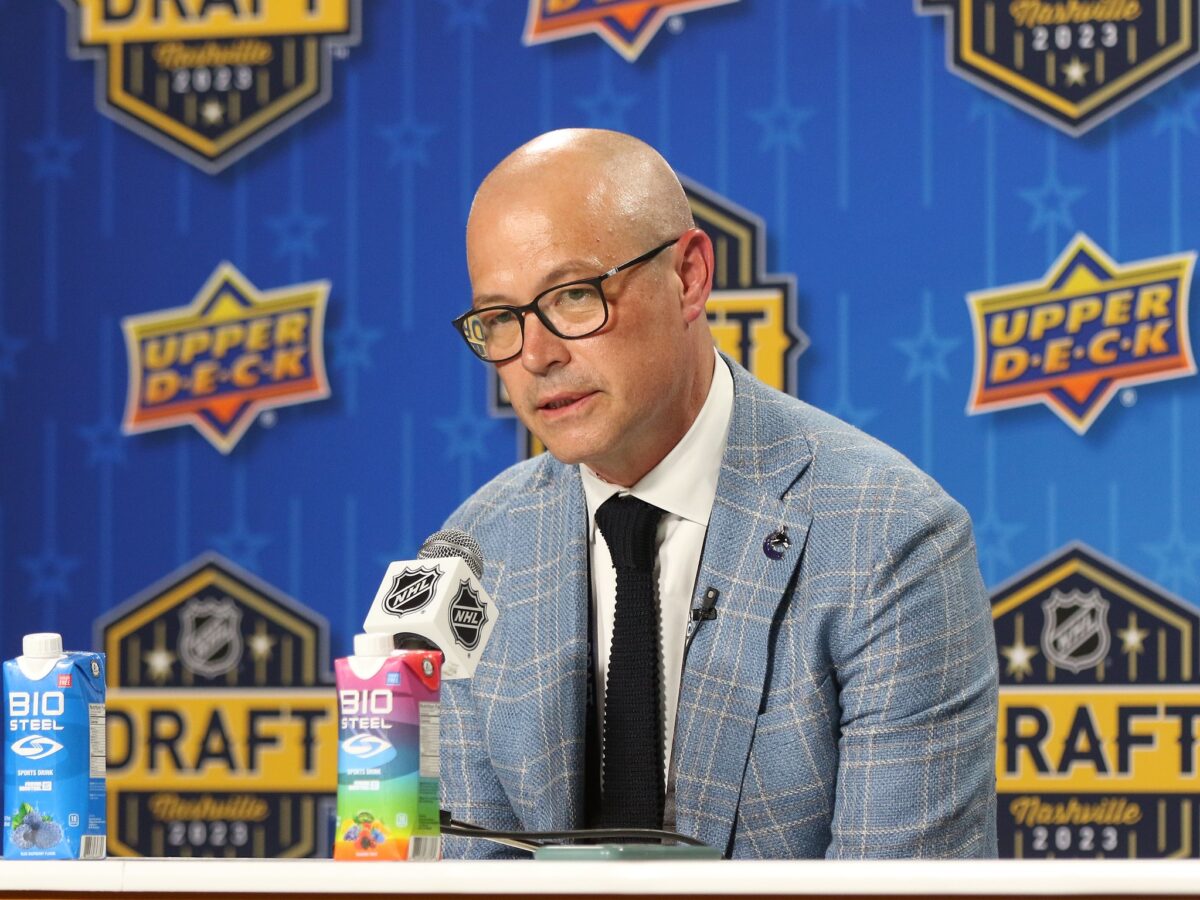The Vancouver Canucks should not sign marquee-free agents when the NHL Free Agency window opens in the 2023 offseason. The Canucks are attempting to maneuver around hurdles of cap mismanagement stemming from previous management groups. Nearly every free agent period during former general manager (GM) Jim Benning’s tenure saw the Canucks dish out lucrative contracts to players not worth the salary they were given. One of the most infamous signings, Louis Eriksson, came in 2016. Since then, almost every season since 2018 has had questionable signings handcuffing their cap, leading to buyouts and salary dumps to rid themselves of the contracts just years after signing them. This article will only look at free-agent signings, not re-signings of restricted free agents (RFA) or pending unrestricted free agents (UFA) the Canucks signed.
Related: Canucks: 5 Worst Jim Benning Trades
Looking beyond 2018 would be unfair to the Canucks, as every team will inevitably sign bad contracts. The issue is how often they have occurred in Vancouver in this short time. This is not to say the Canucks only sign borderline albatross contracts. Luke Schenn, Tim Schaller, Dakota Joshua, Curtis Lazar, and Jordie Benn are among various quality depth pieces signed to reasonable cap hits during free agency. Let’s look at the notable names signed by the Canucks over the last five free-agency periods.
2022 Free Agency: Mikheyev Joins The Club
For their standards, the Canucks did well during the 2022 free-agency period; 2022 was GM Patrik Allvin’s first go-around signing free agents with the organization. The biggest signing that year was Ilya Mikheyev. They signed him to a four-year contract with an average annual value (AAV) of $4.75 million.

Mikheyev only played 46 games during the 2022-23 season, scoring 13 goals and 15 assists for 28 points. The Canucks brought him in for scoring depth and to help on their penalty kill. Unfortunately, he suffered an injury during pre-season and never fully recovered. He got shut down in January to have surgery for a torn ACL. He hopes to make a full recovery and be ready for training camp in the fall. It is unfair to call this signing bad, considering his injury; however, the years before Mikheyev became a Canuck are hard to look at.
2021 Free Agency: Benning’s Final Free Agency
In Benning’s final free-agent period with the Canucks, he signed defenceman Tucker Poolman to a four-year, $10 million contract. Poolman only played in three games last season before suffering an injury on Oct. 18, 2022. The injury sidelined him for the entirety of the 2022-23 season. The injury is an unfortunate circumstance, as he can provide good depth to a Canucks’ blue line in need of defensive help. Although, at the time of the signing, the contract was too much for too long. Aside from Poolman, the Canucks did not sign many bad free-agent contracts. They did re-sign Travis Hamonic and RFA Jason Dickinson to overly expensive contracts; however, free-agent-wise, they did little damage.
2020 Free Agency: Holtby Joins The Canucks
In 2020 the Canucks only notable free-agent signing came in Braden Holtby. He signed a two-year year deal with an AAV of $4.3 million on Oct. 9, 2020. The organization brought him in to offset the loss of starting goaltender Jacob Markstrom that offseason. At the time, the team had an emerging Thatcher Demko, who broke out in the 2020 bubble playoffs and looked to be their full-time starter for the 2020-21 season. Holtby was brought in to play a 1A/1B goaltending role, splitting starts between Demko and him. This plan blew up in Benning’s face. Holtby’s horrific season resulted in him becoming the backup for Demko, and his high cap hit made him unmovable.

Holtby had a 7-11-3 record during the 2020-21 season with a .889 save percentage and a 3.67 goals-against average, the worst numbers of his NHL career. The Canucks bought out the remainder of his contract in the summer of 2021, not even one year after signing the contract. Holtby’s signing and the subsequent buyout is an excellent example of how poorly the Canucks handled free agency during Jim Benning’s tenure as GM.
2019 Free Agency: Tyler Myers’ Arrival
The Canucks hunted for a top-four physical defenceman in the summer of 2019. Insert 6-foot-8, heavy-hitting Tyler Myers, and Benning and Co. found themselves drooling over him. The Canucks signed Myers to a five-year contract with an AAV of $6 million. He hasn’t scored over 21 points in a season since joining the organization, despite playing nearly every game the last four seasons. Myers has scored 14 goals and 63 assists for 77 points in 283 games with the Canucks. The defenceman’s slow skating does not translate well to the speed and skill of today’s game, often getting bested in footraces for the puck.
The Myers contract is a perfect example of what the Canucks should avoid as 2023 free agency opens. The Canucks are searching for a defenceman to help bolster their top four. Sound familiar? Ryan Graves, Carson Soucy, and Justin Holl are all options for the Canucks to sign, but depending on the contractual details, the contracts may become albatrosses down the line. The Canucks are reportedly trying to trade Myers this offseason, freeing themselves of the last year of his deal. Doing so will likely cost a second-round pick at a minimum. The Myers signing is a cautionary tale of absurd overpayment. If the Canucks want to progress as a franchise, they should avoid signing deals like the Myers deal this free agency.
2018 Free Agency: Bottom-Six Grit
The Canucks signed Jay Beagle and Antoine Roussel to matching four-year contracts with an AAV of $3 million. The club aimed to get gritty, physical players to play in their bottom six. Their ambitions brought in hefty contracts for players far from the AAV they commanded. Roussel played 141 games for the team over three seasons, scoring 17 goals and 31 assists for 48 points. Beagle also played three seasons with the Canucks, scoring six goals and 20 assists for 26 points in 142 games.
Neither player finished their contract with the Canucks. Roussel and Beagle, along with Louis Eriksson, were sent to the Arizona Coyotes in the Oliver Ekman-Larsson trade that brought him to the Canucks. The Beagle and Roussel contracts did not work out. The bottom-six grit ‘n’ grind role they both played wore on their bodies. The most games Beagle played in a single season with the Canucks was 57, and Roussel, 65. Paying through the nose for low-skill, high-energy players is risky, and the risk failed for the Canucks in 2018.

It seems current Canucks management has learnt from the regime before them. Allvin is taking a cautious approach to the 2023 free-agent class, a promising sign for Canucks fans. Their first go-around with free agent signings in 2022 brought in good depth options and a solid pick-up in Mikheyev. The Canucks want to add defensive reinforcements to their back end, but the price for a top-four defenceman on the open market will command a premium, something the Canucks can’t afford. The Canucks should avoid signing the big-name players, let players graduate from their American Hockey League teams, and target cheaper options to bolster their depth.